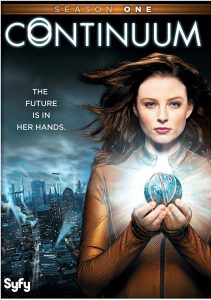With “Fringe” winding down, “Continuum” (7 p.m. Central Mondays on Syfy) is a possible successor among sci-fi shows about the fight against futuristic totalitarian governments. Or is it? The premiere episode starts out that way, but by the end of the hour, one could argue that “Continuum” actually takes the side of the state against the freedom fighters.
Its political leanings are murky, and the reason for this is that our hero character works for the North American Union, in the Vancouver District, in 2077. She’s Kiera (Rachel Nichols), a “protector” (read: police officer; note the Orwellian terminology) outfitted with all the day’s tech goodies. Although she’s human, her field of vision is similar to that of a Terminator. She also can communicate with headquarters without any external devices. She simply talks and hears the communication in her brain. And another implant is essentially a hard drive that records what she sees — she downloads it at HQ at the end of each day.
Kiera’s one-piece bodysuit is also high-tech. She’s able to apprehend criminals largely with the suit itself, as it provides a thicker layer of defense than meets the eye while also enhancing her strength. It also absorbs bullets.
The North American Union is portrayed as totalitarian and oppressive, an extrapolation of the U.S. today, although everyone is recognizably human, unlike in “Fringe” where the Observers’ bald heads and lack of emotion sets them apart. The government is called the “Corporate Congress” — just as taxpayers recently bailed out large businesses and banks in the U.S., those corporations will later bailout the failed governments of the U.S., Canada and Mexico in “Continuum,” thus solidifying the unholy alliance. There are also elements of cruelty and invasiveness to the protectors’ methods: Once Kiera apprehends the suspect, she injects him with something and advises him to report to the nearest precinct before the pain sets in, then walks away. Kiera also has a truth serum in her arsenal.
In short, the United States Bill of Rights most decidedly does not exist in the 2077 of “Continuum.” Most people seem to be accustomed to it, although we don’t get a good look at what day-to-day life is like. It seems better than that of “Fringe’s” 2036, where the Observers literally pump chemicals into the air that shortens human life spans, but that’s only a cursory judgment.
“Continuum” doesn’t have a cut-and-dry political stance, because although the freedom fighter in the opening scene outlines grievances that mirror the modern-day liberty movement, he then blows up a building filled with a lot of innocent bystanders in addition to his corporate/government targets.
The action moves to 2012 when Kiera gets caught in the terrorists’ time-travel device. This group of eight consists mostly of unambiguously nasty fellows. One not-as-bad guy suggests that since they went back further than they intended to, there is still time for a political solution. But the main thug, Travis (Roger R. Cross, best known as Curtis Manning on “24”) says, no, we’re gonna start the war now.

Oh, and to wrap up the housekeeping of the pilot episode, Kiera — stuck in 2012 — joins up with the Vancouver Police Department. However, she is able to communicate via her high-tech device with teenager Alec Sadler (Erik Knudsen), who is in the process of inventing the tech in his computer-laden barn behind the family house. Future Alec is a corporate magnate played by William B. Davis of “X-Files” fame; despite his status in the power structure, we’re given hints that he might not be all bad.
There are too many Orwellian touches to think that “Continuum” has statist leanings. Yet at the same time there’s no denying that Kiera is the good guy and the freedom fighters (the group goes by the awkward name “Liberate”) are the bad guys. This isn’t a bad place for the series to start from, of course, as it allows for nuances to be teased out as it moves forward.
A big reason to stick with the show is Nichols, who I’ve liked since the 2005 crime drama “The Inside.” She’s an understated but compelling actress, and she certainly wears the high-tech bodysuit well. Young Alec is also likable; the actor wisely doesn’t play up the super-nerd angle. Shot in Vancouver for Canadian TV, “Continuum” is a nice-looking, respectably acted show. The question mark is the writing. Political gray areas are inevitable, but will it be heavy handed, or more subtly played? Better yet, will it have something fresh to say on the issues of liberty and oppressive states?
“Fringe’s” futuristic battle for freedom is in many ways beautifully done, but it rarely delivers a fresh take on these age-old, yet currently pressing, issues. And, honestly, I have even less hope that “Continuum” will deliver on that point. Still, the foundation has been poured efficiently enough, so I’ll be back to see what the story builds into next week.

